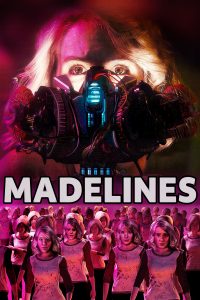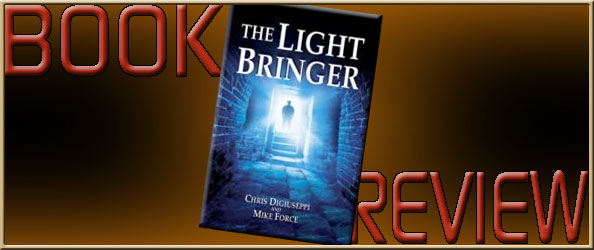Film Review: MADELINES Twists the Time Travel Tropes


Madelines (2022)
Directed by Jason Miller
Written by Brea Grant & Jason Miller
Produced by Ed Dougherty
Unrated, 1h 20m
There are quite a few tropes in the mix for Madelines: inventing in the garage, amazing device put together with limited resources, time loops creating duplicates, having to kill duplicates to avoid the destruction of the space-time continuum…
Wait, what was that last?
At first, Madelines appears to be as advertised: a time travel movie with “unforeseen consequences that could destroy the space-time continuum” (think Jennifer McFly meeting herself); but then it delivers an interesting twist on the time loop scenario. Our intrepid scientists, Owen (Parry Shen) and Madeline (Brea Grant) get just this close to time travel using various pieces of fruit — and establishing the danger because re-constituting the organic matter is a little unrefined, thus setting up the danger. So when the guy with the money, Rory Devonshire (Richard Riehle) starts to pressure the couple for results, we get the inevitable high-risk jumping in with both feet. Madeline takes it upon herself to crunch the numbers late into the night, getting that last little bit of programming in place so she can skip ahead in the experiments and prove time travel is safe for humans.
And then things go awry, as they do.
With the intent of programming in a failsafe to bring her back in case something goes wrong, Madeline accidentally programs in a loop that creates duplicates of herself that start showing up after a certain amount of time. And the appearance of more Madelines, they figure, threatens the space-time continuum. Now, this is where things go to unexpected places. The trope gets twisted when they figure on killing the loop duplicates instead of going back immediately and fixing the issue. Because the longer it takes to figure out the glitch in the program, the more Madelines show up to threaten the very fabric of reality.
And then it goes doubly awry. But I won’t spoil it.
Given the trials and challenges in getting this film done, I’m surprised it holds together as well as it does. And it’s pretty tightly crafted, as far as the story goes. The time travel is handled with only a little bit of handwavium, and there’s nothing glaring that pops out and screams “story logic!” in the midst of trying to get us to buy this particular snag in time travel causality theory.
Brea Grant does the heavy lifting when it comes to displaying different personalities for the various Madelines that show up, but Parry Shen anchors the whole thing. He’s our proxy as he moves from excited (but cautious) to reluctant to resistant. The emotional arc is his, and while the different Madelines give Grant an opportunity to flex her acting chops, Shen carries the audience through the spectrum of enthusiasm to horror as it really sinks in what they’re doing.
I also have to give props to the production team for managing to shoot and finish a feature film under less than optimal circumstances. Now, there are those who have reviewed this film with what I think is a misplaced expectation. It’s not an action blockbuster. It’s not a multimillion dollar franchise tentpole film. It’s a low budget production, and you can see that they’re managing limited resources. A smaller cast and fewer locations can mean a little more focus on the story itself, and if you allow yourself to accept the pace of the story, it builds progressively as Owen starts to realize just how much of a disaster is on the horizon.
However, some of the criticism of the ending is, I think, justified. As we get to the climax of the story, when it feels like some things are just going to get even more complicated, the story just … ends. And it’s not quite a deus ex machina scenario, but it does feel like there’s at least one connecting scene that’s missing. There’s a scene that establishes an issue, identifies a complication, and then the next scene we’re eliminating it without seeing how we get from point A to point B. There’s something on the cutting room floor that would have made the ending land a little more solidly. It still holds up because you can fill in the blanks in your head, but we shouldn’t have to do that kind of work to make the ending more satisfying.
Overall, it’s a fun mixup of time travel tropes, and it’s a fun distraction for an hour and a half.
![]()




